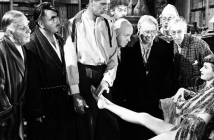
The Wrecking Crew (2008)
Cast: Lou Adler, Herb Alpert, The Association
Director: Denny Tedesco
Country: USA
Genre: Documentary
Editor’s Note: The Wrecking Crew opens today in Toronto at Bloor Hot Docs Cinema with other Canadian cities to follow. The films also opens on cable video on demand and iTunes on March 13th, 2015.
It’s been a while since I’ve been riled up by a music event and I guess the Grammys this year brought its share of memes and discussions. There was a photo going around the internet about amount of writers it took to write Beyonce’s album while Beck was seen as one man writing band. This brought to mind the fact that many incredible albums have hired virtually unknown armies of writers and studio musicians. While successful, Michael Jackson didn’t play an instrument well. Frank Sinatra’s greatest hits were either covers or songs written by other people. This is an industry fact: what makes a hit is the perfect sound in the perfect package.
… a documentary that highlights the world of the 1960s studio musicians that were imperative in creating the memorable sounds of rock and roll.
In comes Denny Tedesco’s The Wrecking Crew, a documentary that highlights the world of the 1960s studio musicians that were imperative in creating the memorable sounds of rock and roll. Believe it or not, many of these artists played almost anonymously in classic hit tunes and records. Musicians like Tommy Tedesco (the director’s father), Glen Campbell, Hal Blaine, Carol Kaye, Don Randi, Plas Johnson, and well, can you recognize any of those names? Well, you should because chances are you’ve heard their work with The Mamas and The Pappas, The Beach Boys, The Association, Sonny and Cher, Elvis Presley, Nancy Sinatra, The Byrds, The Monkees, The Righteous Brothers, and et cetera, et cetera. Well known artists and bands would show up to the studio to record their albums only to be replaced or enhanced by studio musicians like The Wrecking Crew, as they were later known.
Through candid interviews and a treasure of archival footage, Tedesco manages to expose an interesting study of how the music industry has changed after the dawn of rock and roll. They were working clubs and doing they best they could to make ends meet. Studios would scout for session players and eventually, with the right chemistry, being at the right place at the right time, and the musicianship they had, the crew came together as a reliable unit. When asked about playing rock and roll or helping Phil Spector create his signature “wall of sound” a couple of musicians elucidate with a mere (I’m paraphrasing here), “It was different. I played it, got paid, and went home.” Over time they came to understand that their contributions weren’t merely as players, but inventors of sounds and innovative techniques. Brian Wilson was so impressed with them that he used them instead of his band to record the seminal Beach Boys’ album Pet Sounds.
As consumers, The Wrecking Crew elucidates, with its many nuances, that we should be appreciating the craftsmanship and the work that goes into the art that we love.
It’s important to note that this is the way the music industry was and how it still is today. A lot of these musicians lost out on money or credit on the albums or hits they had played in. It was common for studio musicians to collect their pay upfront in order to support their families. Music was work that paid well then. Other times, credit was given to others or names omitted to keep the images of the artists on the covers. Saxophonist Plas Johnson would often go un-credited even though he had played some of the most famous and recognizable sax intros. In the film, he kind of shrugs it off, but you can tell in the pauses there is still a bit of resentment within the group. Yet, there is no denying that the band appreciated their place in music history; some of them wished the outside world would too. From walking chunky bass lines to experimental drumming work, there are notable moments in music history’s evolution to be taken in during this film. It’s great to see attribution and appreciation where it belongs.
One of the more compelling stories featured is that of bassist Carol Kaye. Kaye was the only woman in The Wrecking Crew and although the film emphasizes this fact, her fellow musicians didn’t really care. As an exceptional bass player she stands out on her own, and as a woman trying to make it in an all boys’ club, I’d wish they would have explored more. But the story only suffers this detriment because of the amount of people that were part of the Wrecking Crew. At one point in the film, they do a small count of the expansive roster they had. The members of the crew mention varied numbers. They don’t even remember how many of them were involved.
The stories told in The Wrecking Crew are an unforgettable and important documentation in the preservation of music history. Music might not be the same it was back then, but then again, that’s what many used to say during the sixties about the music before it. Do we appreciate or thumb our noses at what creates the best sounds of today. Will we look back and wonder what the hell were thinking, or maybe, asking ourselves why aren’t we listening and digging beyond the sounds and the image? Modern music brings us heavy production and manufacturing, it’s just they way everything is crafted now. There’s no one guy/girl behind the music: there’s a team, and beyond that team there is so much more at stake. As consumers, The Wrecking Crew elucidates, with its many nuances, that we should be appreciating the craftsmanship and the work that goes into the art that we love.
The stories told in The Wrecking Crew are an unforgettable and important documentation in the preservation of music history.



